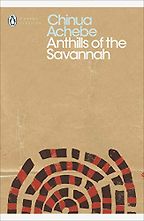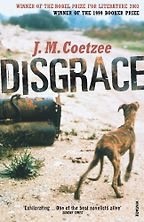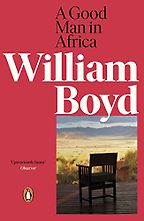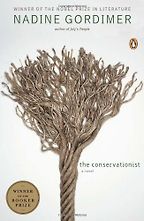What is African literature?
It comes in different varieties. One is African literature written by Africans, and which in South Africa has a particular dimension. Another is white writers writing about Africa. Some people deny there’s any such thing as “white writing” but in fact there clearly is. White writing is a phrase used by John Coetzee [Nobel Prize for Literature 2003]. It’s about the predicament of the white person in Africa – people who have been dropped down, willingly or unwillingly, in an alien environment, and who try to make an accommodation with it.
Now a writer like Nadine Gordimer [Nobel Prize for Literature 1991] thinks she’s made such an accommodation with Africa that there is no such thing as white writing at all, but when you look at her books they’re essentially about the same problem: the white man in Africa. It goes back to Conrad and probably further.
Who would you like to start with?
Let’s start with Anthills of the Savannah by Chinua Achebe. Achebe is black, but we would think of this book as extremely European and dating back to an older writing tradition in Africa, aimed at people who have an English or British education. It’s a totally wonderful book about a man who engineers a coup in a West African country and what happens to him. Remarkable resonances now, of course.
But it’s about what happens to him and his group of friends. The whole coup fails, the conspirators variously executed or assassinated, but it ends up with a fairly ritualistic ceremony in which, despite everything, African values reassert themselves.
Despite what?
In spite of the country’s Westernisation. It’s a Sandhurst trained army officer who tries to take over the country. But what Achebe is saying is that the country will essentially remain African.
And what would that African-ness comprise?
I think it would comprise a large dependence on ritual and traditional African beliefs. Ben Okri, writer of The Famished Road, once gave me an example of that. He told me that if a businessman, going to a meeting with British Airways on some important contract, saw a chicken in the road on the way, he’d go to a soothsayer to ask what that chicken was trying to tell him, even at the risk of being late for the meeting.
Let’s talk about Coetzee. He’s a white South African émigré like you, isn’t he? Though he lives in Australia.
If you have an interest in Western culture, or particularly in high art as Coetzee does, you discover that in South Africa there is actually no role for you any longer. And I think that Disgrace is a sort of farewell note to South Africa – a “Goodbye, I’m off”.
What happens in Disgrace, which is also relevant I think to Achebe, is that the protagonist’s daughter is raped by a local warlord – a local “big man” – and she accepts it as the way things happen in Africa. But her father does not accept it. He’s left the university because he doesn’t like the new political correctness there, and then his daughter is raped and she just accepts it. She’s not happy about it but she certainly doesn’t think of leaving the country.
Her father, on the other hand, can’t accommodate himself to it, and neither can Coetzee. I’ve recently read the last volume of his autobiography and what I take away from it is that he thinks there is no meeting place between Western and African culture. He’s not anti-African, but he says explicitly there is no common cause.
And is this your view as well?
It’s slightly more complex. What Coetzee says is that he was never a joiner, so that even though he was deeply distressed by what his own people, the Afrikaners, were doing, he nevertheless identified with them. He would never have joined any overt political movement – the ANC or any of the other alternatives. And before I came to university here in England I had the same sort of option. We were all virulently against apartheid, but I couldn’t see why I’d join a Marxist or Trotskyite organization because I was against apartheid. I was a liberal.
So from Coetzee’s point of view it was more that his love of European literature meant that he couldn’t fit himself into what this multicultural society in South Africa was producing. My take is much the same on that. It’s the difference between those who join the latest politically fashionable party and those who may sympathise but who cannot accommodate or truncate themselves in order to fit the offered category. Turgenev’s Fathers and Sons comes to mind.
A Good Man in Africa by William Boyd sounds a bit lighter, perhaps – more humorous.
It is. Boyd was brought up in Ghana and Nigeria. It’s about the white man in Africa again, but it is lighter. It’s not insensitive, it’s quite sensitive to African life, but it’s really a comedy. It’s about a young diplomat’s life: an undersecretary in the embassy of a country quite like Ghana. It has elements of an old theme, the white man being treated as something extremely special in Africa whether he wants to be or not.
And why do you think that is?
My own take is that Africans want to know how it is that white men have got their hands on all the money. They believe there’s some trick you can learn. It’s a bit like people asking you how you write – how you get your ideas. Well there’s a bit of that, and then there’s the hierarchical tradition in Africa.
White people have always been pretty near the top, because they governed many countries in Africa for quite some time and because, even in post-colonial Africa, they always have a role which is among the governing classes, the managing classes, the banking classes. Of course the wretched white Zimbabweans belong to the farming classes which the government has no respect for whatsoever. But that’s a slightly different point.
All the same, it does give us a bridge to Nadine Gordimer, who you say feels she has accommodated herself so perfectly to Africa that she doesn’t believe in “white writing”.
Well she’s a wonderful writer but I think it’s not true about white writing. If you read her books and you know the history, I think that Nadine’s books are quite closely pegged to real events in Johannesburg and South Africa. And they’re always seen from the position of a white sympathiser – there’s one in every book. Quite often she’s written black characters, but the idea that she’s an African writer, that she has penetrated the African consciousness, it’s not possible.
The Conservationist seems to be about South Africa as a living thing rising up against the colonials.
Yes. The protagonist is a good man trying to do good things – a businessman who owns a farm he runs as a sort of hobby. But the sense is that your priorities are not necessarily the priorities of the land or the people that you find yourself in. That’s what makes it a very good book, I think. It’s a funny problem because liberal white people in Africa have always thought that Africa has a special destiny for them – that the landscape was speaking to them – that they had some sort of special control over events and over the landscape itself. Which to some extent they did by farming and ploughing and shaping it.
But you find even now that the white people in South Africa, the ones who are left, who have not emigrated, believe that they are still in charge. And really what’s happened is that the Africans are making a muck up of a country that is really theirs in some strange, inexplicable way. What you get from Coetzee and Achebe is the opposite. Africans are doing it their way. Africa will always revert to its deep beliefs.
And what would you say about European influence on Africa? Has it really been superficial?
No, it’s very profound. But to take a very simple case, if you’re a black doctor in Africa – you qualify at a medical school in London then come back – your aim is not to go out into the deepest forests and help people. You’re a big man now. This is a gross generalisation but it happens to be true. Your aim is not to go out and serve the people in the way the whites believe a doctor in Africa should do. The aim of the new government in South Africa is to enrich itself as fast as possible. The new billionaires in the country are all dollar not rand billionaires.
It’s not just a political point, it also comes down to what the writing should be about. Are we saying that there’s a peculiarly African style of writing – in English or in the native languages – which will develop or has developed? And that is one of the many themes which the African intellectuals espouse – that they must develop a completely unique African style of writing.
But the fact is that the market is in English or in French. Ben Okri told me that he didn’t want to be thought of as an African writer, and I said, “But Ben, you are an African writer and you write about Africa.” And he said, “But I want to be treated like McEwan and Boyd and people like that.” This was some time ago.
Finally, Joyce Cary’s Mister Johnson, which sees a temporary clerk in Nigeria waste his money entertaining on a grand scale.
Well Joyce Cary is an interesting case. He lived in West Africa for a while and understood clearly the tensions between the colonial masters and the local people. I’ve chosen Mister Johnson because it’s a tremendously funny, witty and human book about exactly that. A very influential book. Carey made the case very early on – in about 1940 I think – for African liberation. He wasn’t one of your conventional English writers just using it as a background.
And how do you feel that your own writing fits into all this?
Well, one of the things you find in South Africa is that all academics are completely locked into post-colonial theory, a form of self-torture. I’m discussed in a great volume about writing against apartheid – me and Coetzee and others who were writing against race. I think they feel that we are the right wing and attach no importance to race issues as such. Well if that’s what they’re saying it’s untrue. I think that race is way more important that they like to acknowledge, and way more irrational.
November 16, 2009. Updated: September 15, 2021
Five Books aims to keep its book recommendations and interviews up to date. If you are the interviewee and would like to update your choice of books (or even just what you say about them) please email us at [email protected]
Five Books interviews are expensive to produce. If you've enjoyed this interview, please support us by donating a small amount.










